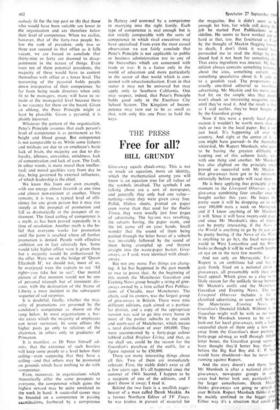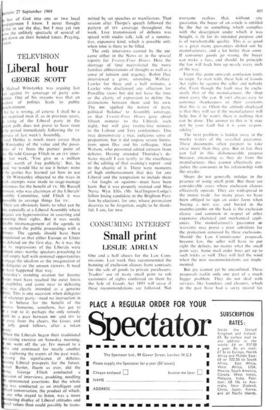THE PRESS
Free for all?
BILL GRUNDY
Give-away equals chuck-away. This is not so much an equation, more an identity, which the mathematical among you will know is an equation true for all values of the symbols involved. The symbols I am talking about are a sort of newspaper, and generally they only had one value- nothing—since they were given away free. Pallid, lifeless sheets, printed on paper even worse than that used for the Radio Times, they were usually just four pages of advertising. The lay-out was revolting, the adverts boring, the paper stank, and the ink came off on your hands. Small wonder that the sound of them being pushed through the letter boxes of a suburb was invariably followed by the sound of them being crumpled up and thrown straight into the waste-paper basket. Give- aways, as I said, were identical with chuck- aways.
But not any more. For things are chang- ing. A lot has happened in the past month or two to prove that. At the beginning of this month the Manchester Guardian and Evening News group bought a string of give- aways owned by a firm called Post Publica- tions of Cheadle, near Manchester. The chain, said its owners, was the largest group of give-aways in Britain. There were nine different editions, each aimed at a particu- lar district, and a copy of the appropriate version was said to go into every home in most of the posher suburbs to the south and south-east of Manchester, which means a total distribution of over 100,000. They were accompanied by a forty-page colour tabloid called Brighter Living, and that, as we shall see, could be the reason for the Guardian's purchase of the outfit, for a figure reputed to be £50,000.
There are many interesting things about all this. Two of them are immediately relevant. First, the stable didn't exist at all a few years ago. It's all happened since the summer of 1964. Second, I happen to be a recipient of one of the editions, and I don't throw it away; I read it.
Behind the two facts is a smallish eager- beaver of a man called Derek Meakin. As a former Northern Editor of TV Times, he was tireless in pursuit of material for the magazine. But it didn't seem to enough for him, for while still doing tha job he started Post Publications as a sideline. He seems to have worked just as hard at that, too. But fascinated as I am by the thought of Meakin flogging hini,eit to death, I don't think it would ha‘ e persuaded me to read the things he pro. duced had it not been for something eke That extra ingredient was interest. My local edition always contains something historical about the area, something current, and something speculative about it. It adds up to a goodish read. The proportions are usually one-third editorial to two-thirds advertising. Mr Meakin and his merry men had hit on the simple idea that people won't chuck an interesting magazine awns until they've read it. And the result is that, as I said earlier, they've been bought up by the Guardian group.
Now if this were a purely local pheno- menon it wouldn't be worth more than an inch or two in the local paper. But it isn just local. It's happening all over the country. And right at the centre of it—as you might have guessed—is the Australian whizz-kid, Mr Rupert Murdoch, who seems to be having the greatest difficulty in keeping out of this column lately, what with one thing and another. Mr Murdoc has also alighted on the principle which proved so successful with Mr Meakin- that give-aways have got to be interesting editorially before people will read them.
He is busy applying that principle at this moment to the Liverpool Observer, a ne give-away combining four smaller ones h bought earlier this year. He hopes tha, pretty soon it will be dropping on to tsc-I over 100,000 mats a week on Merseyside and if I know anything of Mr Murdoch it will. Since it will have twenty-odd pages. and since Mr Murdoch's idea of interest can be pretty interesting, if the Nears o the World is anything to go by (it can als be pretty boring, if the News of the Wor is anything to go by), the local newspape world in West Lancashire and the Wirral looks as though it will be well worth keeping an eye on in the next few months.
And not only on Merseyside. For Our Rupert is an ambitious lad and has hi gaze firmly fixed on a national chain o give-aways, all presumably with their oNt local appeal. Which gives us a clue to th likely reason for the unlikely tie-up between Mr Meakin's outfit and the ManchestL Guardian and Evening News. The nes Liverpool Observer includes a lot o classified advertising, or soon will. So doe' the Manchester Evening News. th Guardian's financial lifebelt. Without it. th Guardian might well be with us no mak, With Mr Murdoch known to be on th look-out for local give-aways, with a highl. successful chain of them only a few mil away from the Guardian's door pushing forty-page ad-mag as well through 100.001 letter boxes, the Guardian group seems t have thought they'd better buy them before the Big Bad Boy did. C. P. se,,` would have shuddered—but he never 1H running against Rupert.
And the story doesn't end there. Sin Mr Murdoch is after a national chain give-aways, newspaper groups in oth• areas had better look out, particularly the larger conurbations. Derek Meaki thinks give-aways are going to spread a. over Britain. Rupert Murdoch thinks it be mainly confined to the bigger cine Either way it's a situation that could P fear of God into one or two local ,1NPaPerMen I know. I never thought live to see the day, but I may yet run ss the unlikely spectacle of several of ;11 down on their bended knees. Praying,







































 Previous page
Previous page